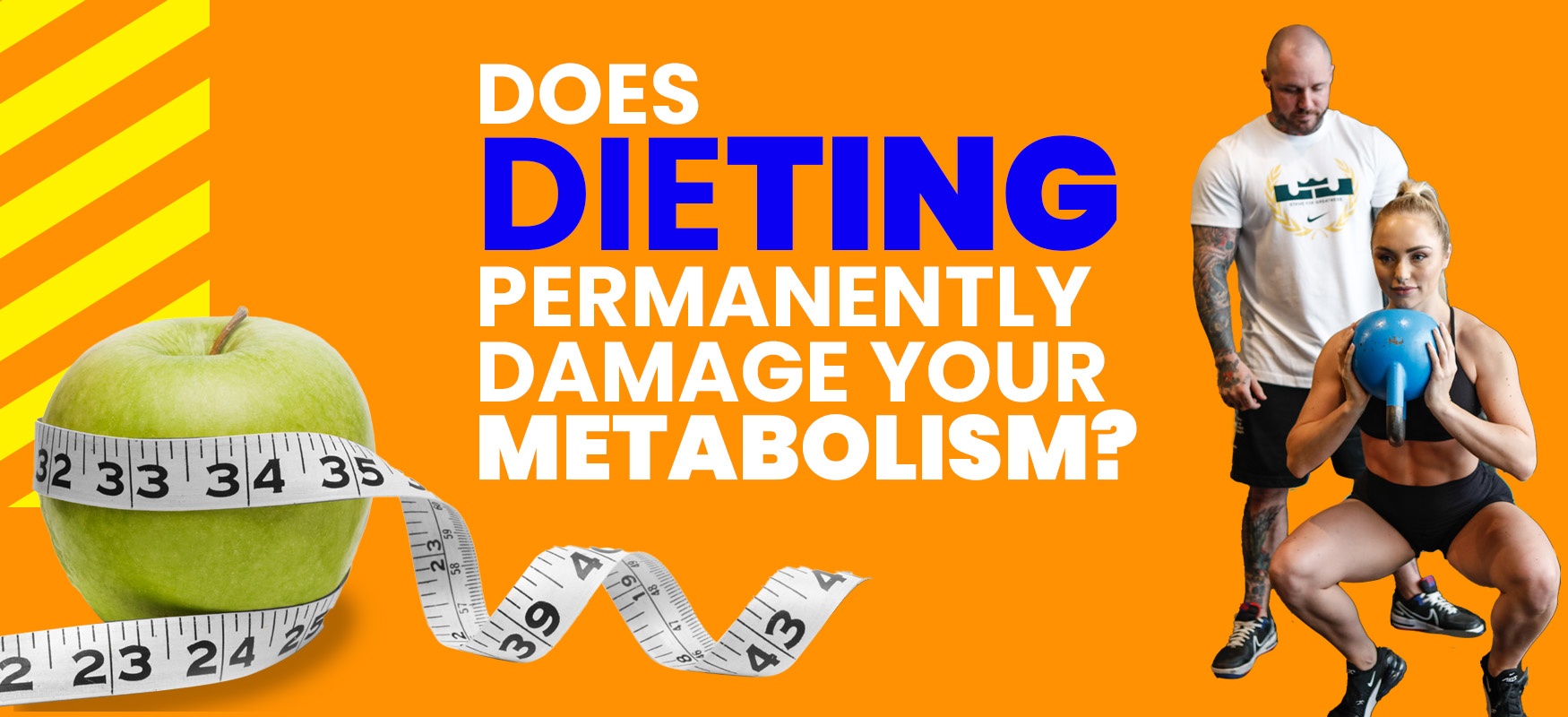Does dieting permanently ‘damage’ your metabolism?

The idea that dieting causes permanent damage to metabolism isn’t a new theory. No doubt you’ve heard the words ‘starvation mode’ shouted all over Instagram which suggests that your metabolism will ‘slow down’ if you eat low calories and your body will start to ‘store’ fat.
Most of the time these claims are backed with a solution which involves handing over your hard earned money for a ‘special’ supplement or telling you to “eat more” which only leads to gaining more fat.
So, is starvation mode real?
To answer that question you need to know what metabolism actually is.
Metabolism is the chemical process that occurs within a living organism in order to maintain life.
It is comprised of four main areas:
- Basal Metabolic Rate: The total number of calories that your body needs to perform basic, life-sustaining functions.
- Non Exercise Activity Thermogenesis (NEAT): The energy spent on all daily movements that are not sleeping, eating or exercising. This includes things like fidgeting and blinking.
- Exercise Activity Thermogenesis (EAT): Energy expended during planned exercise.
- Thermic Effect of Feeding (TEF): The energy required to digest the food we consume.

NOTE: BMR is the largest component of metabolism followed by NEAT, TEF and then EAT.
If starvation mode really did exist then the prisoners of war who were denied food wouldn’t have died of starvation. The human body requires energy (calories) to function. Without energy, the systems that keep us alive cannot occur. The idea that energy can be created from nothing goes against the laws of thermodynamics (“energy cannot be created or destroyed”).
Therefore, we can be confident that starvation mode doesn’t exist, but that doesn’t explain why people ‘plateau’. Why do people stop losing fat if adherence isn’t an issue?
The body does have some intelligent ways of halting our progress in response to underfeeding through a process called Metabolic Adaptation.
Metabolic Adaptation occurs via:
- Reducing metabolic rate (you weigh less so you require less energy to exist)
- Improved mitochondrial efficiency (your body becomes more efficient at using energy. Efficiency in this scenario isn’t helpful)
- Alteration of hormones which affect hunger (self explanatory)
- Decrease in NEAT levels (you move less subconsciously)
- Decrease in exercise performance (you expend less energy)
Basically, you require less energy to simply exist.
Why does metabolic adaptation occur?
The human body can’t tell the difference between real famine and an intended period of calorie restriction. It will attempt to decrease the amount of energy that your body requires to sustain life and perform basic processes in order to keep you alive (another reason why the theory of starvation mode makes absolutely no sense!).
This process was helpful in the hunter-gatherer era but a real pain in the ass when you’re dieting for summer. What’s important to know is that it is normal and that your body is doing exactly what needs to be done if you do ever experience metabolic adaptation.
Can we avoid Metabolic Adaptation?
Given it’s something we evolved for our own survival, we can’t stop metabolic adaptation from occurring. Remember, your body doesn’t know the difference between your intentional calorie deficit and being in a true period of famine. We can however, monitor our progress (average weight, measurements & progress photos) to ensure we are tracking in the right direction.
The next step is to have patience. People often freak out if they don’t see progress in one week and assume they have hit a plateau or are experiencing metabolic adaptation. Also, a plateau is not a few days of not losing weight or even gaining weight. It is a few weeks or more without seeing any progress – whether that be in scale weight, measurements or progress photos.
If you have found you haven’t progressed after a few weeks, before assuming that it’s your ‘metabolism’, look at your behaviour and make sure you’re actually adhering to your plan. Licks, bites and sips of untracked items here and there add up a lot and calories count as much on weekends as they do during the week.
If after a few weeks of not progressing despite being compliant, you can look at altering a few different variables:
- Decreasing calories
- Adding in further exercise via cardio
- Increasing incidental exercise through the use of steps
- Taking a diet break if adherence is the issue
You can’t change your BMR (unless you gain weight), or your mitochondrial efficiency, so focus on what you can change!
Is this change in metabolism permanent?
Not according to a systematic review conducted in 2016 which looked at the weight regain of individuals who were initially within a healthy weight range, to determine if fat loss caused a permanent change in their metabolism.
It concluded that “changes in energy balance induce a rapid yet reversible increase or decrease in Resting Metabolic Rate. Our findings indicate that the theory of permanent, diet induced metabolic slowing in non obese individuals is not supported by the current literature.”. This is good news for everyone who loses fat at some point in their life.
Finally, how do you ‘reverse’ metabolic adaptation once you reach your goal weight?
Simple – have a plan after the diet! Your process doesn’t stop once you reach your ‘goal weight’. From my experience that’s where the hard work begins. It’s important to dedicate a certain period of time to a fat loss phase and then maintain that result with an intelligent reverse dieting protocol to avoid undoing your hard work.
PS: If you’re interested you can read the article here: https://esmed.org/MRA/mra/article/view/908/626
Yours in health,
Sheridan Skye
Head of Nutrition







